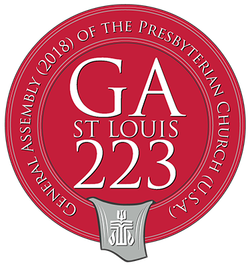
Tracing centuries of shared values tempered by tensions, historian the Rev. Beth Hessel on Friday showed members of the Way Forward Committee that this isn’t the first time Presbyterians have worked to realign how they’re governed.
With a full docket, the committee began its work three days earlier than the General Assembly’s 11 other committees, which convene Monday (June 18).
The executive director of the Presbyterian Historical Society, Hessel told committee members that shared governance – giving clergy and elders equal governing weight – “has always been a key value of who we are.”
But there are tensions baked into the Presbyterian system of governance: Should the church be centralized or decentralized? Corporate or missional? Should the focus be national or more local?
“For you, the church is your local congregation, the ministry you do,” she told committee members. “For the people at the presbytery, synod or national level, it is often the church as a whole. It’s two different ways of seeing the church and being the church.”
Even within the colonies that would become the United States, the Presbyterian form of governance goes way back. The first presbytery, at Philadelphia, came together in 1706, while the first synod was formed 11 years later.
Since then, the church has seen periods of more top-down governance interrupted by times of a more decentralized focus.
As the committee hears testimony next week and begins to deliberate over important issues of governance and power-sharing, Hessel said, committee members will be once again debating what it means to be a missional church and how Presbyterians should live out their polity. Hessel concluded her talk with a 1972 quote from the former Presbyterian Church in the United States:
“There is a widely felt desire for a structure which is flexible, permeable and responsive to the whole church.”
That desire, she said, could have been voiced in 2018 as well.
The Rev. Charles Wiley, the committee’s resource coordinator, gave committee members an overview of the denomination’s six agencies and one that’s almost an agency, but not technically – Presbyterian Women.
The Book of Order, he pointed out, says almost nothing about the six agencies – the Office of the General Assembly, the Presbyterian Mission Agency, the Presbyterian Investment and Loan Program, Presbyterian Publishing Corporation, Presbyterian Foundation and the Board of Pensions. It’s not until page 105 of the Manual of the General Assembly that one begins to read about the six agencies.
Presbyterian Women “functionally is an agency, but technically they are not one,” Wiley said. “Presbyterian Women is not subordinate to the General Assembly.”
It does publish the Horizons Bible Study, “one of the most extensive [resources] in the church,” he said. And Presbyterian Women, along with Korean Presbyterians and others, paid for the chapel in Presbyterian Center in Louisville, Ky.
“I can’t tell you why things are the way they are,” Wiley told the committee of the current array of agencies. “I can just tell you what is.”
